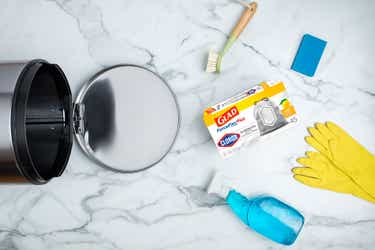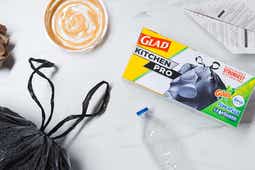What You’ll Need for Successful Trash Can Cleaning
Before you can hunker down and start the trash can cleaning process, you have to gather the supplies you’ll need in order to get the job done. Here’s a list of cleaning materials to have handy before you tackle cleaning your trash can.
- Rubber gloves
- A garden hose or bathtub
- All-purpose cleaner or disinfectant spray
- Baking soda (optional)
- A sponge, microfiber towel or bristled scrub brush with a long handle
- Paper towels or an old towel
Trash Can Cleaning in 5 Simple Steps
Even though scrubbing a smelly trash can might not be something you look forward to doing, the good news is that trash can cleaning isn’t actually a difficult chore. Just follow these five simple steps and your trash can will be spotless — and odorless — in no time.
Step 1: Empty the Trash Can
Before you clean your trash can, it needs to be totally empty. Don your rubber gloves, take out your trash as usual, and then go a step further, making sure to remove any lingering food particles or debris that may have fallen into the can itself.
Step 2: Rinse it Out
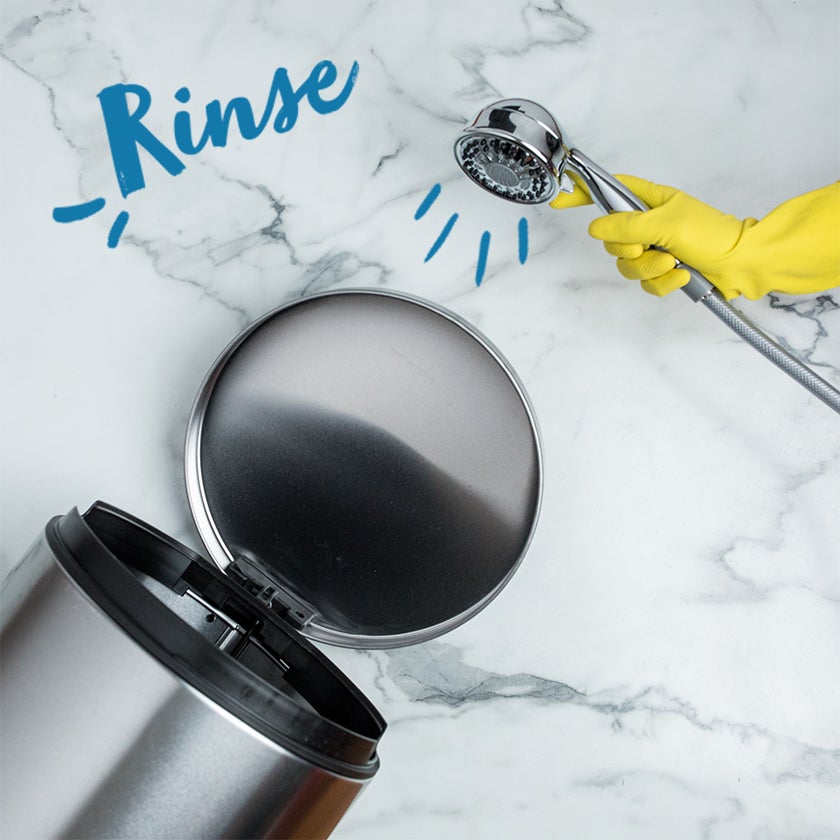
The next step is to rinse your can out with water. If you have outdoor space, the easiest way to rinse your can is to use a garden hose outside. Otherwise, you can haul your trash can into the bathroom and rinse it out in the tub.
Step 3: Spray and Deodorize
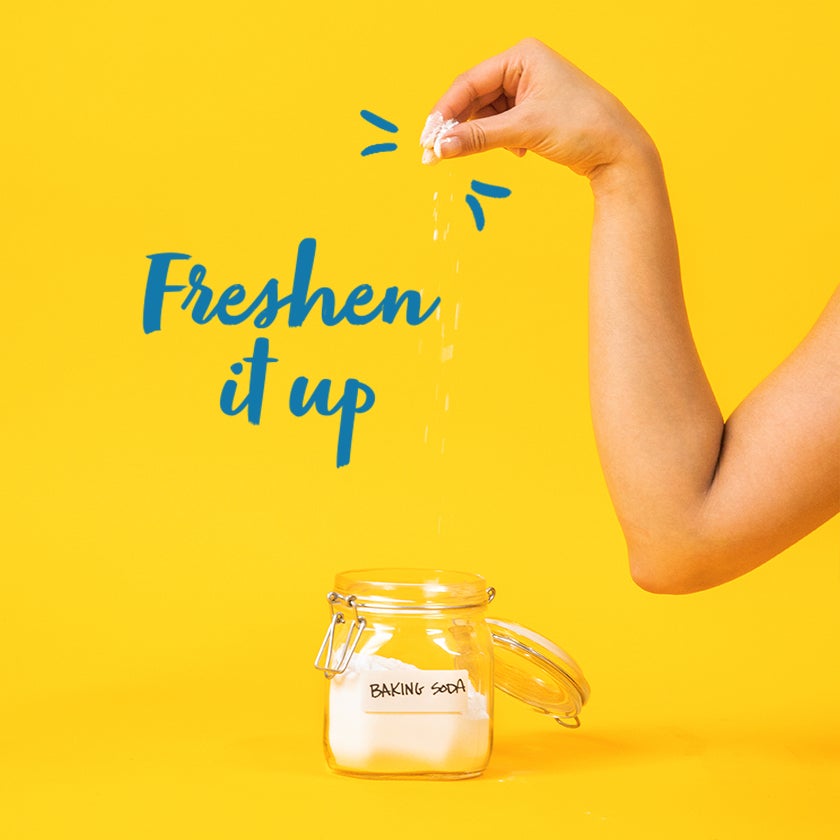
Once the trash can has been rinsed, take the cleaner of your choice — you can use any disinfectant spray or all-purpose cleaner — and spray down the inside and outside of your can. If you want to go the extra mile to make sure your trash can smells fresh, you can also take about half a cup of baking soda and sprinkle it inside your can to deodorize it. Let the cleaner and/or deodorizer sit for 5–10 minutes.
Step 4: Give it a Scrub
Next comes the most laborious part of the trash can cleaning process: scrubbing the can out. You can use either a sponge, a microfiber towel, or a bristled brush for this part — just don’t forget to also scrub the outside of the trash can and its lid!
Step 5: Rinse and Dry

When the can has been scrubbed to your satisfaction, thoroughly rinse it again — either with your garden hose or in the bathtub — and then dry it off with paper towels or an old towel. Make sure you don’t put a new trash bag in until it’s totally dry so no mold-causing moisture gets trapped in the can.
Preventing the Comeback of a Stinky Trash Can
It might not be possible to ward off trash can odor permanently, but there are a few easy habits you can adopt that will help you avoid a stinky trash can for as long as possible in between cleanings.
Use a Trash Bag with Odor Protection
One easy hack to prevent a stinky trash can? Invest in a trash bag that comes equipped with heavy duty protection against leaks and odors, like Glad’s Kitchen ForceFlex MaxStrength™ Bags Gain Original Scent, ForceFlex MaxStrength™ with Clorox® Bags Lemon Fresh Bleach Scent or try scented kitchen trash bags to eliminate garbage and trash smells.
Wipe It Out Regularly
To prevent the need to do a full-blown scrub of you trash can as often, make it a habit to do a “mini cleaning” every time you take out the trash. Simply spray the inside of your trash can with disinfectant and quickly wipe it out before you replace your trash bag.
Deodorize Your Trash Can
If you plan to clean your trash can a couple of times a month, you can sprinkle a little baking soda in the bottom of your trash can to neutralize odors — just beware of it clumping up and creating a mess if you don’t clean your can often. Other deodorizing alternatives include placing dryer sheets or sprinkling cat litter in the bottom of your trash can.
Ways to Ward Off Mold in Your Trash Can
One unfortunate side effect of a dirty trash can is the potential for mold growth. According to the CDC, the presence of mold can cause symptoms like stuffy nose, wheezing, and red, itchy eyes — and can be even more dangerous to someone with a mold allergy or weakened immune system. Below are a few small ways to avoid a big mold problem.
Ensure No Liquids Escape
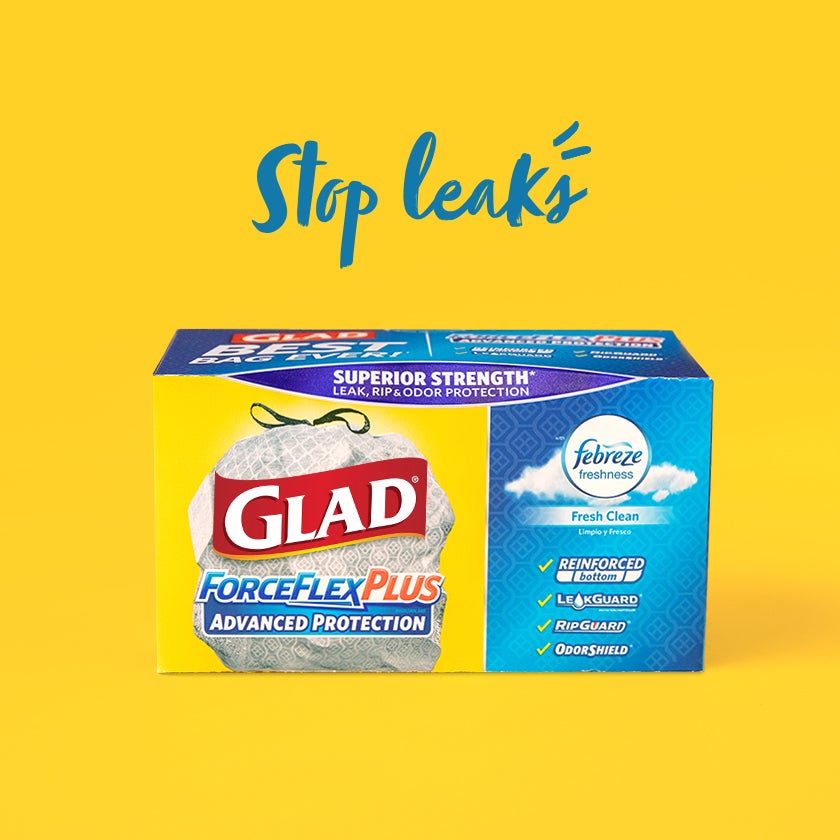
Mold loves wet and humid conditions, so if you want to prevent it from growing in your trash can, make sure you take measures to prevent leaks. Using a trash bag like Kitchen ForceFlex MaxStrength™ Bags Fresh Clean Scent — with LeakGuard, RipGuard and a reinforced bottom — will help to ensure no pesky liquids drip into your trash can. You can also put any liquids or runny food products in a separate, smaller bag within your trash bag for an extra layer of mold protection.
Don’t Miss Trash Day

The easiest way to ensure you’re not inviting mold growth in your trash can is to empty it as often as possible so mold has less time and opportunity to grow. Start by setting reminders so you never miss trash day. Also, be sure not to overstuff your trash can, because overstuffing can cause leaks, which you now know mold loves.
Use Newspapers to Soak Up Moisture
Have old newspapers lying around? Give them a new purpose by using them as liners in the bottom of your trash can (in addition to your regular trash bags). The newspapers will work to absorb any incidental moisture that’s given off by foods in your trash, which will help to prevent mold growth — plus they work as a deodorizer by absorbing garbage smell, too.
How to Keep Outdoor Garbage Cans from Smelling
Trash can odor doesn’t just happen in the kitchen — your outdoor garbage cans can be major sources of stink as well. If you can’t stand getting a whiff of stinky garbage whenever you take your trash out, learning how to keep outdoor garbage cans from smelling is a gamechanger.
First, make sure any trash bags are tightly sealed before throwing them into your outdoor trash bins to prevent waste from leaking or spilling and creating odor. For the same reason, it’s also a good idea to nix the habit of tossing small, loose items — like fast food bags — into your outdoor garbage cans without bagging them first.
Routinely cleaning your outdoor garbage cans is also crucial to odor prevention. After your trash is collected, spend a few minutes rinsing your trash cans out with a high-pressure garden hose — and a little mild dish soap if you desire — then set them out in the sun to make sure they dry completely before putting any new trash in. Pro tip: drill a few holes in the bottom of your outdoor trash cans to make it easier to rinse the cans out regularly (this helps rainwater drain out naturally, too).
Lastly, deodorize your outdoor trash cans the same way as your kitchen trash cans: to absorb odors, sprinkle some baking soda or cat litter in the bottom of the can, and lay some old newspapers down to absorb mold-causing moisture.


